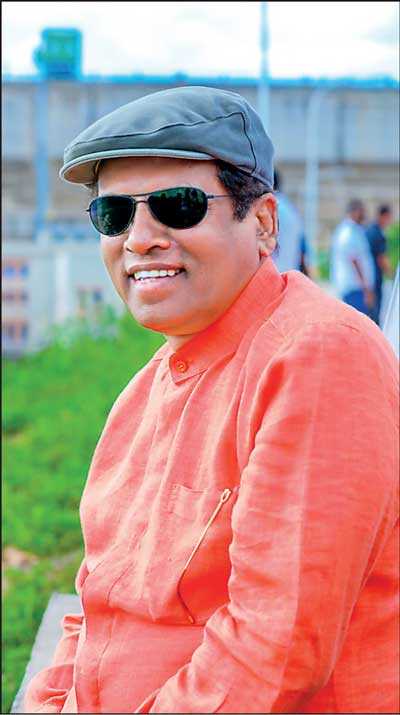Wednesday Feb 18, 2026
Wednesday Feb 18, 2026
Wednesday, 12 December 2018 00:00 - - {{hitsCtrl.values.hits}}
The executive presidency was established in 1978. Since then there has never been as much hope for its abolishment as there is right now. It however still requires many actors to come together to work towards its abolishment.
 |
To assume President Maithripala Sirisena is completely oblivious to the unpopularity of his actions is naïve. His relative calm manner can be attributed to a lack of consequence to his actions |
The 20th as brought to the house by the JVP is agreeable to all stakeholders. It will require a bipartisan movement within Parliament to pass. Civil society must now press for its legislative passing. If brought to the current parliament it should pass. Both prime ministerial hopefuls will support it.
Why Parliament supports the 20th
Put in other words: Why would Members of Parliament support it? It would increase the powers of Parliament. Such legislative movement is also made possible by the lack of MPs within Parliament that are loyal to the President. Most public support is split between the UNP and thereby its Leader Ranil Wickremesinghe and Mahinda Rajapaksa.
The proposed Amendment1 reads in a certain section;
“Provided that, notwithstanding anything to the contrary in the Constitution, the person so elected as President shall, unless he ceases to hold office in accordance with the provisions of the Constitution, continue to hold office until a President is elected by the next Parliament.”
To assume Sirisena is completely oblivious to the unpopularity of his actions is naïve. His relative calm manner can be attributed to a lack of consequence to his actions. He is hoping to run a smear campaign of his own against any who politically stand against him. Even if he fails at the Supreme Court it will still be very difficult to remove him. He remains in control of the SLFP.
Abolishing the executive presidency is popular. Further Mahinda and Ranil seemed to be acting in some form of agreement towards more parliamentary power. Since the current President has signalled that he is against holding a presidential poll2 and that his party has gone so far as to snub CBK3 it is likely that he will use his command of the SLFP and its MPs to negotiate a scenario whereby he retains the presidency. He is already working on positioning himself as a statesman amongst his voter base4. Also, by contesting under a common symbol he has prevented any direct comparison of popularity to the former strongman. He further has the backing of a powerful shadowy media network.
Why the executive presidency is bad
Public resentment against the post of an executive president is both widespread and longstanding. Every single elected president since its establishment would have been charged in courts for criminal activity. The holding of absolute power has resulted in political killings and widespread corruption. It has used this absolute power to greatly weaken democratic institutions. The SLFP has campaigned on multiple occasions for its abolishment. The Yahapalanaya Government also received its mandate on the promise of its abolishment but later pulled back5 with many blaming the SLFP leadership.
The executive presidency, much like British colonial rule, divides the country ethnically in a bid to remain in control. It is majoritarian and benefits from ethnic divides. It takes economics out of politics. Rich and poor within ethnic minorities vote the same way. It was designed by a sociopath (JRJ) to maintain UNP power. This did not work as planned. The civil war prevented ethnic minority participation in politics and further galvanised the ethnic majority to band together.
In terms of defence
Almost all executive presidents have poked into the black box of defence spending in their own monetary interests. Further many have used the army against its own citizenry6. The crimes of the military forces against the people of this country is longstanding and cuts through all ethnicities and socio-economic groups. Both major political parties are responsible.
Releasing land in the north is in the interests of national security as it allows people to have economic opportunity which prevents them from pursuing an agenda against the State. Land release is prevented by a President who lends his unaccountability to the defence forces.
In terms of development
To suggest that the executive presidency is required to push development projects is not based on any self-respecting perspective of the Sri Lankan people. Sri Lankans can support development projects through a parliamentary system. Stakeholder participation and compromise are good for development projects as they ensure that the development is as inclusive as possible. Parliament provides a means for transparency in terms of procurement.
Major projects have been completed in Sri Lanka under presidents. Critiques argue whether the economic benefits outweigh the costs. Most would agree, doing so in the 2015 election, that though major construction was undertaken during the Rajapaksa regime there was little actual value. Value to the nation was delivered by the subsequent government. Renegotiation of contracts resulted in; changes of land rights from freehold to leasehold, repurchase of Hambantota Port at contracted values by China, and the right to information over any future negotiations. This was through parliamentary actions.
A parliamentary system is bad for white elephants. This is where the complexity and scale of operations allows for major theft of public funds. To develop we do not need such mega projects. Sri Lankans want HDI instead of just GDP.
In terms of sovereignty
The concept of sovereignty is defined as the full right and power of a governing body over itself. Sovereignty lies on a spectrum. For instance, European Union countries have foregone certain powers to the European Court of Justice. We must ask ourselves if a presidential system gives increased sovereignty over a parliamentary system. Does an ordinary Sri Lankan have more power in a presidential or parliamentary system?
Footnotes
1. https://parliament.lk/uploads/bills/pbills/gazette/english/1326.pdf
2. https://timesofindia.indiatimes.com/world/south-asia/no-early-lanka-presidential-poll-maithripala-sirisena/articleshow/65733104.cms
3. http://www.dailymirror.lk/article/I-was-not-invited-to-SLFP-special-convention-Chandrika-159444.html
4. http://www.dailynews.lk/2018/12/08/local/170711/president-opens-iranamadu-tank-fulfilling-promises-farming-community
5. https://www.colombotelegraph.com/index.php/exclusive-abolition-of-executive-presidency-comes-a-cropper-powers-to-be-pruned/
6. http://www.lankaweb.com/news/items/2016/07/18/black-july-33-years-ago/